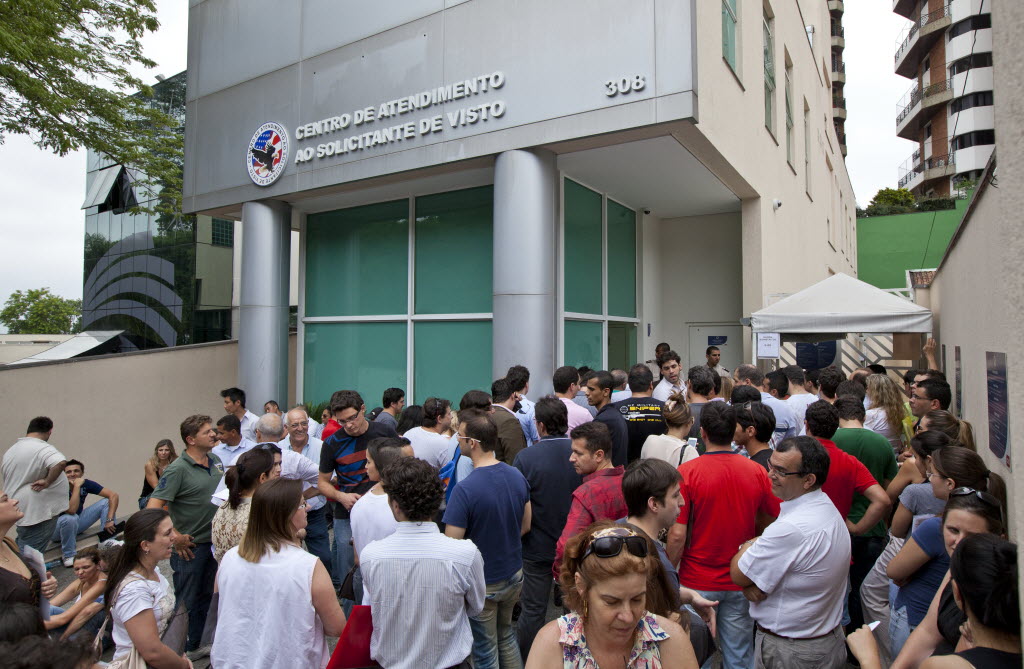As many annoyed travelers are currently finding out, visas are required even for tourist travel between the two countries. It’s the consequence of ‘reciprocity,’ which increasingly feels like officials in Washington and Brasília needlessly banging their heads against one other. But in the wake of the Snowden revelations, things are not likely to improve.
Anna Jean Kaiser
San Francisco
I’ve spent the last few days watching chaos ensue at the San Francisco Brazil consulate as thousands of Americans try to get their Brazilian tourist visas. For fear of driving away their biggest customers, FIFA has put big-time pressure on Brazilian consulates to grant visas to World Cup fans, so ticket holders are given a free visa and priority over other services. If you’re a tourist without World Cup tickets, the likelihood of getting to Brazil is low.
Brazilian consulates in the US are swamped and lines wrap around the block. In soccer-loving San Francisco, Wednesdays are World Cup drop in days – where some 200 people show up with tickets in hand, take a number, and wait.
Americans will be the largest represented foreign fan base at the 2014 World Cup in Brazil – with 154,412 tickets sold to Americans as of early April. But more than a few have run into an often unexpected road bump: unlike citizens from most European countries, all Americans need to obtain tourist visas prior to visiting Brazil.
As a US citizen living in Rio, I’ve had my fair share of headaches dealing with the visa system. But as we’re often reminded, Americans are only put through this because it’s what the US puts Brazilians through. Brazil’s immigration policy is based on the principle of ‘reciprocity’ – that is, Brazil forces citizens of foreign countries to go through what their country makes Brazilians put up with.
In practice it’s actually tougher on Brazilians, whose experiences with the US consulates can be time-consuming, costly, and sometimes insulting. They often have to travel long distances to get to interviews, they have to pay a much higher fee (proportional to national GDP per capita) and they are actually asked questions – tough questions – at their interviews. They are sometimes denied the right to visit the US. For US citizens, the “interview” rarely consists of more than –
“You’re going to Brazil for tourism?”
“Yes.”
“OK. Have fun.”
Reciprocity as a guiding principle seems to be as sensible of an immigration policy as one could come up with. But given the fact that the friendly countries generally seek to attract tourists and trade from one another, why does it feel like they continue to push each other away?
A lot of it has to do with the failure of relations between the two largest countries in the Western Hemisphere to improve under Obama and Rousseff. In the wake of Rousseff’s disgusted reaction to the Snowden revelations, there’s little hope that will change soon.
Obama and Biden have said repeatedly that the US wants Brazilians to visit – Brazilians spent US$10.5 billion in the US in 2013, according to the US Department of Commerce, a 31% increase from 2012.
A recent opinion piece in the New York Times by Roger Cohen described contemporary US/Brazilian relations as an “odd hostility in the Americas.” While far from being enemies, Brazil and the US don’t have a particularly prosperous partnership. On top of strict immigration, there’s no doubt that in recent years, Lula and Dilma have made problematic moves in the eyes of the White House, and vice versa. Brazil’s relationships with Cuba and Venezuela have made Washington uneasy and Lula’s signature on a nuclear deal with Iran and Turkey led US Secretary of State Hillary Clinton to say that Turkey and Brazil were “making the world a more dangerous place.”
The NSA revelations showed the world that among the US’ spying targets were President Dilma Rousseff and Brazil’s oil company, Petrobras. Soon after, US Secretary of State John Kerry came under fire for these actions during a state visit in Brasília, and Dilma became the first Head of State to cancel a White House dinner. She made her anger known and demanded an apology, which she did not receive.
This strained relationship goes back many decades. The US abused the region for much of the 20th century.
After years of US -backed military dictatorships and the perceived failure of imposed ‘neoliberal’ policies associated with the “Washington Consensus”, standing up to the US has been an easy way for Latin American politicians to score points domestically. When we saw the rise of the center-left at the turn of the century – Lula, Kirchner, Chavéz, Morales – they all ran on a ‘take no orders from the US’ platform.
And so it remains. Brazil and the US, two huge democracies with similar cultures and citizens who mostly love each other, continue at loggerheads. It’s a shame. And for travelers, a headache.
Photo – chaos outside the US consulate in São Paulo in 2012. Editing and additional writing added by Vincent Bevins in São Paulo.


